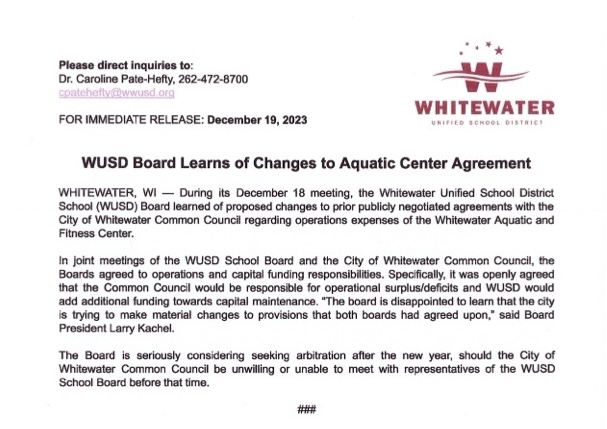?? Updated 1.23.24: To be rescheduled due to snowy weather. There will be a showing of Indiana Jones and the Dial of Destiny @ Seniors in the Park, in the Starin Community Building: Adventure/Action Rated PG-13 2 hours, 34 minutes (2023) In this fifth installment, Indy (Harrison Ford) now a college professor approaching retirement, is forced…
City
City, Daily Bread, Local Government, School District
Daily Bread for 1.10.24: Leopards.Do.Not.Change.Their.Spots.
by JOHN ADAMS • • 3 Comments
Good morning.

Wednesday in Whitewater will be cloudy with a high of 32. Sunrise is 7:24 and sunset 4:40 for 9h 16m 29s of daytime. The moon is a waning crescent with 1.1% of its visible disk illuminated.
On this day in 1946, the United States Army Signal Corps successfully conducts Project Diana, bouncing radio waves off the Moon and receiving the reflected signals.
If Whitewater ever needed a refresher on special interests in the city, here’s a maxim worth remembering:
Leopards do not change their spots.
If a Getty Images photo of a leopard doesn’t convince (and honest to goodness it should), here are two posts relevant & material to this very topic —
Whitewater’s Residents Have a Front Row Seat to the Special Interest Method:
Special Interests Would Rather Not Be Seen. Ideally, they will put their operatives and catspaws on boards and commissions without much attention. For elected positions, they’ll look for districts with no one else running. Districts like that are a golden opportunity to run candidates wholly devoted to them but so objectionable to ordinary residents that those types of candidates could never win otherwise.
Special Interests Typically Speak (Deceptively) in the Language of Good Government:
Typically (but not always), special interests speak deceptively in the language of good government. They will ask for cooperation, partnerships, collaboration, openness, and transparency. To get close, they will speak the language and make the sounds of those they seek to manipulate.
Their technique is effective with well-intentioned people who assume (mistakenly) that everyone else is well-intentioned.
There are other approaches special-interest men will try, if they’re denied their unjustified requests. They may express outrage (how dare you?! insane! outrageous!). This outrage has both a cause and an intended effect. The cause is, most often, an insult to their excessive sense of entitlement. It hurts them that others do not see them as special, gifted, or better than others. So they squeal and shriek when someone reminds them that they aren’t what they think they are, or they don’t deserve an extra portion of dessert, etc.
This expressed outrage often works an effect favorable to the special-interest types: others simply back down to avoid a confrontation.
If speaking in the language of good government doesn’t work, and if outrage doesn’t work, they may try to show how they are, in their view, more deserving than others. They will not do so themselves, however; they will find a catspaw who will praise how deserving they are in grandiose terms (how much these types supposedly love, care, or feel). These claims will not be measurable (one person’s love against another, for example). Indeed, how could they be? Nonetheless, grandiosity will be their starting point.
Where they are, commentary & criticism will follow. Neither will stop until they do.
What is the smallest country in the world? Here’s its area:
City, Culture, Daily Bread, Local Government, School District, Technology
Daily Bread for 1.9.24: Awry Comes at You Fast
by JOHN ADAMS • • 5 Comments
Good morning.

Tuesday in Whitewater will be snowy with a high of 34. Sunrise is 7:24 and sunset 4:39 for 9h 15m 07s of daytime. The moon is a waning crescent with 4.8% of its visible disk illuminated.
Whitewater’s city hall and schools are closed today. Play responsibly.
On this day in 2007, Apple CEO Steve Jobs introduces the original iPhone at a Macworld keynote in San Francisco.
Yesterday’s post included a video of the successful launch of a private lunar lander (see US firm launches moon lander to space). Not long afterward, that mission went awry. Kenneth Chang reports American Company’s Spacecraft Malfunctions on Its Way to the Moon (‘After a flawless launch to orbit, the privately built robotic Peregrine lander is unlikely to reach the lunar surface because of a failure in its propulsion system’):
The first NASA-financed commercial mission to send a robotic spacecraft to the surface of the moon will most likely not be able to make it there.
The lunar lander, named Peregrine and built by Astrobotic Technology of Pittsburgh, encountered problems shortly after it lifted off early Monday morning from Cape Canaveral, Fla. The launch of the rocket, a brand-new design named Vulcan, was flawless, successfully sending Peregrine on its journey.
But a failure in the lander’s propulsion system depleted its propellant and most likely ended the mission’s original lunar ambitions.
“The team is working to try and stabilize the loss, but given the situation, we have prioritized maximizing the science and data we can capture,” Astrobotic said in a statement. “We are currently assessing what alternative mission profiles may be feasible at this time.”
And there we are: awry comes at you fast. Foresight allows the avoidance of many problems, yet not all. For the unavoidable remainder, it’s “what alternative mission profiles may be feasible at this time.”
Whitewater, historically, has never been adept at either foresight or alternative missions.
We can do much better.
South Korea passes bill to ban dog meat industry:
City, Daily Bread, Energy, Solar, Waste Digesters
Daily Bread for 1.8.24: Wisconsin’s Largest Solar Park Opens
by JOHN ADAMS • • Comments
Good morning.

Monday in Whitewater will be cloudy with a high of 36. Sunrise is 7:24 and sunset 4:38 for 9h 13m 48s of daytime. The moon is a waning crescent with 10.5% of its visible disk illuminated.
Whitewater’s Planning Board meets at 6 PM.On this day in 1982, in the United States, AT&T agrees to the Breakup of the Bell System, divesting itself of twenty-two subdivisions.

By Yodel2010 – Own work, CC BY-SA 4.0, https://commons.wikimedia.org/w/index.php?curid=137522909
Joe Schulz reports Wisconsin’s largest solar park is now fully operational, featuring 830K panels (‘Badger Hollow project will provide enough energy to power 90K homes’):
The largest solar project in Wisconsin history is now fully operational in Iowa County, its developers announced Thursday.
The second phase of the Badger Hollow Solar Park began powering homes and businesses last month. The first phase came online in December 2021.
Badger Hollow is a partnership of We Energies, Wisconsin Public Service and Madison Gas and Electric. The utilities say the 830,000-panel site will generate 300 megawatts of electricity, enough energy to power roughly 90,000 homes.
Officials say the panels used also capture solar energy on both sides, which could prove useful in the winter when the sun reflects off snow and onto the panels.
Some years ago, a former city manager in this town insisted that a waste digester, with the importation of manure into Whitewater, would be the ‘greenest’ possible project. He was wrong. After multiple expensive studies found the proposal lacking, the city abandoned a project it should never have considered.
When that municipal manager left, he insisted that ten years hence he would be proved right. He will never be proved right, as wrong cannot be made right. Twice since FREE WHITEWATER began publishing in 2007 efforts for a digester have been turned back. Whitewater will never be a place for the importation of other communities’ animal and human waste.
Those looking at green projects will find them in other forms of energy production, including smaller solar projects for this city.
US firm launches moon lander to space:
City, Film
Film: To Be Rescheduled Due to Inclement Weather: A Haunting in Venice
by JOHN ADAMS • • Comments
?? Updated 1.8.24: To be rescheduled due to snowy weather. There will be a showing of A Haunting in Venice @ Seniors in the Park, in the Starin Community Building: Mystery/Drama Rated PG-13 1 hour, 43 minutes (2023) Agatha Christie’s celebrated sleuth Hercules Poirot, now retired and living in self-imposed exile in Venice, reluctantly attends a…
City, Climate, Daily Bread, Economy, Weather
Daily Bread for 1.4.24: Wisconsin’s Snowfall and Whitewater’s Student Housing
by JOHN ADAMS • • 3 Comments
Good morning.

Thursday in Whitewater will be partly cloudy with a high of 32. Sunrise is 7:25 and sunset 4:34 for 9h 09m 10s of daytime. The moon is a waning crescent with 46.2% of its visible disk illuminated.
Whitewater’s Landmarks Commission meets at 6 PM.
On this day in 2004, Spirit, a NASA Mars rover, lands successfully on Mars at 04:35 UTC.
Snowfall was down in December for northern Wisconsin, as Danielle Kaeding reports in Lack of snow threatens to upend business, winter activities in northern Wisconsin (‘Warm weather led to drastically reduced snowfall for the month of December’):
In northern Wisconsin, where outdoor enthusiasts live for snow and ice, warmer than usual weather has skiers and snowmobilers turning to wheels, and race organizers breaking out snowmaking machines.
In December, weather stations in Brule, Ashland and Hayward recorded temperatures more than 12 degrees Fahrenheit above the 30-year average, according to the National Weather Service.
Kevin Huyck, meteorologist with the National Weather Service in Duluth, said those areas saw around 11 to 16 inches less snow than average for the month.
“(It’s) definitely been drier than what we’ve seen in the past as far as snowfall for this past month of December,” Huyck said
Understandably, the lack of snow threatens businesses that depend on snow sports. Some enterprises may be able to produce artificial snow, but that creation may not be enough in volume or satisfaction for winter sports enthusiasts.
For it all, however, Wisconsin’s economy does and should rely on many activities rather than fewer. Seeing Wisconsin only through winter sports would be both erroneous and short-sighted.
One can say the same about Whitewater’s student housing market. It’s been profitable for some (a few landlords) who have benefited privately in a relationship with a publicly-funded university. (These gentlemen talk about private business but their income has depended on a healthy public institution. Not one of these men built their enterprises on purely private relationships.)
The city’s economy, however, is and healthfully must be more than a student-housing market (supportive of higher education though I am). Indeed, normal, thriving economies in America simply aren’t built on rental properties. A hundred other industries would take precedence.
Worth considering the next time some of these gentlemen expect preferential consideration…
City, Daily Bread, Freedom of Speech, Local Government, Politics, Poverty
Daily Bread for 1.3.24: Hockey, Hayek, and Hope
by JOHN ADAMS • • 4 Comments
Good morning.

Wednesday in Whitewater will be cloudy with a high of 34. Sunrise is 7:25 and sunset 4:33 for 9h 08m 11s of daytime. The moon is a waning gibbous with 54.9% of its visible disk illuminated.
Whitewater’s Library Board meets in closed session at 4:30 PM.
On this day in 1777, General Washington defeats British General Lord Cornwallis at the Battle of Princeton.
Whitewater has had significant political activity throughout 2023, and the local Spring Election awaits the city in April.
There’s more than one way to think about these changes, but political, economic, and social dynamism is common across America. It’s not merely common, but felicitously a source of our national strength, making us the envy of other peoples around the world.
A few remarks about hockey and Friedrich Hayek (not usually associated) explain much of Whitewater’s recent politics.
Consider ice hockey, starting with the rink on which that game is played.

By Jecowa at English Wikipedia. Public Domain, https://commons.wikimedia.org/w/index.php?curid=1914457
Odd, isn’t it? Circles and lines across a sheet of ice, on a rink where those markings and the players skating in competition would seem incomprehensible to someone unfamiliar with the game.
And yet, and yet, for a little bit of time and willingness, someone can learn about hockey and enjoy watching or playing a game. Indeed, without markings on the ice, and rules of the game, there would be no National Hockey League. A few people might be on a few rinks, but those few would never unite into a profitable professional association.
As it turns out, local governments have their own version of rules from federal & state statutes, local ordinances, and local policies those communities adopt as binding. In Whitewater, relevant & material statutes, ordinances, and policies are compiled (in significant part) in the city’s Good Government Manual and the CDA Rules of Procedure.
A key point that cannot be emphasized enough: these federal and state statutes, city ordinances, and local policies pre-date the current city administration. They are not a new development. They always should have been, and now are, being read and applied as they were meant to be applied. They were years ago lawfully drafted and adopted. If their application has seemed alien to some in Whitewater, then it is because some have unfortunately become unfamiliar or uncomfortable with the lawful rules and procedures for this very town.
To do otherwise would be to expect the equivalent of a hockey game where players follow no rules or different rules, crashing into each other and the boards.
And look, and look — this libertarian blogger is not a member of the government and never will be. This libertarian blogger has never represented the government and never will. It is right, however, to follow the rules properly established at federal, state, and local levels until they are lawfully revised.
Deprecation of these rules does not advance this city; it perpetuates backwardness.
 This brings us to Nobel laureate Friedrich Hayek. Hayek was an opponent of most state planning, and rightly so. He understood, however, that some level of preliminary planning (and this meant government planning) was necessary to make private success possible. His remarks on this point in The Road to Serfdom are oft-quoted:
This brings us to Nobel laureate Friedrich Hayek. Hayek was an opponent of most state planning, and rightly so. He understood, however, that some level of preliminary planning (and this meant government planning) was necessary to make private success possible. His remarks on this point in The Road to Serfdom are oft-quoted:
Nor is “planning” a medicine which, taken in small doses, can produce the effects for which one might hope from its thoroughgoing application. Both competition and central direction become poor and inefficient tools if they are incomplete; they are alternative principles used to solve the same problem, and a mixture of the two means that neither will really work and that the result will be worse than if either system had been consistently relied upon. Or, to express it differently, planning and competition can be combined only by planning for competition but not by planning against competition.
It is of the utmost importance to the argument of this book for the reader to keep in mind that the planning against which all our criticism is directed is solely the planning against competition the planning which is to be substituted tuted for competition. This is the more important, as we cannot, within the scope of this book, enter into a discussion of the very necessary planning which is required to make competition as effective and beneficial as possible. But as in current usage “planning” has become almost synonymous with the former kind of planning, it will sometimes be inevitable for the sake of brevity to refer to it simply as planning, even though this means leaving to our opponents a very good word meriting a better fate.
(Emphasis added.)
F.A. Hayek, The Road to Serfdom 89 (The Collected Works of F. A. Hayek, Volume 2 ed. 2007).
Government’s orderly planning, including the application of established policies, makes government responsible. It also leaves government in its proper, limited place.
Hope for a better future is not only — and not principally — to be found within the walls of city hall. 312 W. Whitewater Street is merely one address in this city. Whitewater is a city of fifteen thousand, not fifteen. Whitewater’s many private needs will not be met through fights among government men or recriminations among them.
The purpose of a well-regulated government, like a well-regulated militia, is (and must be) to protect the flourishing of private life.
There is much that must be accomplished in this regard. See Waiting for Whitewater’s Dorothy Day, Something Transcendent, and in the Meantime, An Oasis Strategy, The Community Space, People Bring Color. From Government, Failure is Both Loss and Distraction, and The Shape of Decline to Come (and How to Carry On).
Hope comes privately and stays privately. She’s more likely to arrive, and more likely to stay, in a city of rules-based limited government.
What’s Up: January 2024 Skywatching Tips from NASA:
City, Daily Bread, Local Government, Pool, School District
Daily Bread for 12.22.23: The Never-Ending Pool Story
by JOHN ADAMS • • 7 Comments
Good morning.

Friday in Whitewater will be cloudy with a high of 45. Sunrise is 7:22 and sunset 4:24 for 9h 01m 44s of daytime. The moon is a waxing gibbous with 79.3% of its visible disk illuminated.
On this day in 1864, Savannah, Georgia, falls to the Union’s Army of the Tennessee, and General Sherman tells President Lincoln: “I beg to present you as a Christmas gift the city of Savannah.”
Whitewater has a pool and fitness center, and has had one for many years. The local school district owns the building and the city manages the pool. Negotiations for a new agreement between those two parties have dragged on for centuries decades a long time.
There are only two ways for a serious person to describe the length of time these negotiations have carried on: as a straightforward, neutral account or as a farce. Professional reporting presents these events, as it must, straightforwardly (leaving readers to decide for themselves how nutty this all is). See School board says it will consider arbitration regarding aquatic center agreement; city cites contractual changes, issues of transparency.
Commentary, however, is not so constrained. And so, and so: These protracted negotiations have long ago descended into farce. What’s wrong with some of these people? Honest to goodness.
I have advocated for months in favor of an agreement. See The Pool (‘The rational course is a settlement that assures ongoing operation at minimal cost while further discussions on medium and long-term solutions are crafted. A reduction in political temperature — down to, let’s say, negative 30 Fahrenheit — would serve this community well’), Prioritization in a Small Town (There’s a tendency in Whitewater for people to flit from issue to issue, supposed crisis to crisis. For example, is there a need to address the substantive quality of a Whitewater public education, an athletic field, or a pool? Is there a need for housing, to address poverty, or to improve the lakes, etc.? These and other matters are important, but which matters more, and in which order should they be addressed?’), and Chronologies (‘From the school board, this has stopped being responsible dealmaking and has descended into negotiations as a fetish. Those who wish to be taken seriously behave seriously. These board changes aren’t serious; they’re ridiculousness cosplaying as seriousness’).
And now, and now… the Whitewater Unified School District describes its view of the negotiations:

To which the City of Whitewater comprehensively responds in a 49-page reply (link and see embed at the end of this post).
A few key points.
This matter should have been resolved months ago.
This matter was not, and could not, have been resolved by a councilman and a school board member sitting in the middle of a room tryin’ to hash all this out. It’s about a detailed contract, and hugging it out wasn’t going to work.
Nothing about this matter will be settled by a ‘save the pool’ committee. A superintendent with an evident will to power was always going to walk all over that tiny band. See More on Messaging in Whitewater (‘At a council meeting about a month ago, a resident pointed out that the City of Whitewater’s success in moving toward a resolution of the funding dispute for the pool rested with Whitewater’s city manager, John Weidl. You know, although I’m not in the habit of touting the public sector, the resident’s observation is spot on. There was a ‘Save the Pool Committee’ formed in the winter or late spring of this year, not long before the April spring elections. That committee held a few of its own meetings, and leading members of that group attended a few public meetings, but it contributed next to nothing to the work that moved pool negotiations along’).
The city administration suggested arbitration months ago; it would have been more economical than protracted negotiations.
Money spent on the pool is a serious matter; time lost when this district’s board president discusses a pool rather than education is irrecuperable.
Finally, the nuttiest development so far is the appearance on the Whitewater Common Council dais of the school district’s press release before the latest council meeting.
Here’s the reporting on the mysterious placing of those documents on the council table:
Responding to questions posed by WhitewaterWise, Whitewater City Manager John Weidl said that he was first made aware of the district’s statement when he found a copy “sitting with my (Tuesday common council) agenda packet materials at the dais.”
He noted that the council president, upon seeing the distributed statement, asked about its appropriateness as a handout.
Weidl said he told the council president that handing the statement out without it undergoing the appropriate process for inclusion on a council meeting agenda would be a violation of the city’s transparency ordinance.
Said Weidl: “I further explained that I would have the city clerk enter a copy of what was received into the public record at the next available opportunity.”
Weidl added, that, to “everyone’s credit, the paper copies were collected and given to the clerk.”
Wait, what? How did copies of the district’s press release appear at the council table before the recent council meeting?

Did Whitewater’s superintendent, ensconced in the district’s office, snap her fingers and summon one of her many elves to scamper across town to deliver the press release?

And if so, did anyone see School Board President Larry Kachel anywhere near the city council table before the meeting?
The memo from the city administration in reply to the district’s press release appears below:
City, Film
Film: Tuesday, December 26, 12:30 PM @ Seniors in the Park, Oppenheimer
by JOHN ADAMS • • Comments
?? Tuesday, December 26th at 12:30 PM, there will be a showing of Oppenheimer @ Seniors in the Park, in the Starin Community Building: Biography/Drama/History Rated R (sexuality, nudity, language) 3 hours, 1 minute (2023) The story of American scientist J. Robert Oppenheimer, and his role in the development of the atomic bomb. Stars Cillian Murphy,…
City, Common Council, Daily Bread, Ethics, Local Government
Daily Bread for 12.20.23: An Ethics Committee for a Normal Community
by JOHN ADAMS • • 4 Comments
Good morning.

Wednesday in Whitewater will be sunny with a high of 40. Sunrise is 7:21 and sunset 4:23 for 9h 01m 41s of daytime. The moon is a waxing gibbous with 58.2% of its visible disk illuminated.
Whitewater’s Park & Rec Board meets at 5:30 PM.
On this day in 1803, the Louisiana Purchase is completed at a ceremony in New Orleans.
Yesterday’s post linked to the agenda and embedded the agenda packet for the Whitewater Common Council session for 12.19.23. Item 22 of the 12.19.23 agenda concerned the city’s Ethics Committee:
22. Discussion and possible action regarding possible retention of outside legal counsel for the ethics committee – City Clerk/HR
General background on procedural events that led to this item is available from WhitewaterWise @ Ethics committee to meet Thursday; council to consider outside legal counsel to advise committee.
A well-ordered town government should be a public institution of laws and procedures, limited in reach, and applied fairly and equally to all. There will always be questions in any community about who did what to whom? Villagers in the foulest hovel in medieval Europe could have asked these same questions, albeit in short lives plagued with disease and poverty.
It is not enough to ask those questions. A well-ordered American town answers those questions methodically, diligently, and fairly. In this way, an ethics committee must give each his or her due (rendre justice) to do justice (rendre la justice).
The advance from a community in the grip of status to a community of free and equal residents depends on doing so.
The city administration’s memo for Item 22 and the city’s Code of Ethics appear below:
Oops — Mission: Impossible Theme Song Interrupts House of Lords Ceremony:
City, Common Council, Daily Bread, Local Government
Daily Bread for 12.19.23: The Second Council Session in December
by JOHN ADAMS • • 1 Comment
Good morning.

Tuesday in Whitewater will be cloudy with a high of 33. Sunrise is 7:21 and sunset 4:23 for 9h 01m 45s of daytime. The moon is a waxing crescent with 47% of its visible disk illuminated.
The Whitewater Common Council meets at 6:30 PM.
On this day in 1776, Thomas Paine publishes one of a series of pamphlets in The Pennsylvania Journal entitled “The American Crisis.”
Linked above is the Whitewater Common Council agenda for the first council meeting of December. Embedded below is the full agenda packet for the session.
After Weeks of Warnings, Iceland Volcano Erupts in Plumes of Fire:
City, Film
Film: Tuesday, December 12, 1:00 PM @ Seniors in the Park, Barbie
by JOHN ADAMS • • Comments
?? Tuesday, December 12th at 1:00 PM, there will be a showing of Barbie @ Seniors in the Park, in the Starin Community Building: Comedy/Fantasy Rated PG-13 1 hour, 54 minutes (2023) This NOT your childhood Barbie! It’s a clever, droll take on beauty, perfection, and feminism. Stars Margot Robbie (Barbie) and Ryan Gosling (Ken). Directed…
City, Common Council, Daily Bread, Local Government
Daily Bread for 12.7.23: Collective and Evidence-Based
by JOHN ADAMS • • 2 Comments
Good morning.

Thursday in Whitewater will be sunny with a high of 50. Sunrise is 7:12 and sunset 4:20 for 9h 08m 25s of daytime. The moon is a waning crescent with 28.9% of its visible disk illuminated.
Whitewater’s Board of Zoning Appeals meets at 6 PM.
On this day in 1941, the Imperial Japanese Navy carries out a surprise attack on the United States Pacific Fleet and its defending Army and Marine air forces at Pearl Harbor, Hawaii. Japanese forces simultaneously invade Shanghai International Settlement, Malaya, Thailand, Hong Kong, the Philippines, and the Dutch East Indies.
Embedded above is a video of the 12.5.23 meeting of the Whitewater Common Council. Yesterday’s post addressed the negligence of this council president on agenda Item 16 about basic council self-governance. See The Council President’s (Willful) Negligence.
Two other parts of the meeting stand out.
Individual Requests. Some members of the council care more about an issue than others, and will express concern when they (as one or two members of a seven-person body) don’t receive the answers they want when they want. One or two members’ expectation of individual service on larger projects is a (chronic) misunderstanding of collective governance. About a requested study of salary comparatives, this misunderstanding arose yet again. The discussion begins at 28:24 on the recording above. Here, as in the past, Councilmember Allen will sometimes speak in the plural (“So we’ve asked you for we’ve given you the list twice now”) when “we” refers to one or two and not a majority of the council. Of individuals requesting as a mere faction, see Scenes from a Council Meeting (Representations) (“what we’re looking to do here” emphasis added) and Micromanaging the City of Whitewater’s Human Resources Work (“Many years ago, a conservative councilmember rebuked a colleague for expecting that individual members have the authority to assign work or projects to city staff. That conservative councilmember was right — it’s a collective body, and individual members aren’t empowered that way.”)
Lack of Support for Claims. It’s odd, but now also a recurring oddity, that one or two council members will make a claim, but when asked will lack information to support their claim. They’re the ones who will present the claim, but then be unable to substantiate it.
At the Tuesday night session, Councilmember Allen contended that some communities requested as part of a salary comparison were omitted from a city-supplied list, but when asked if he had examples of omissions (“Could you give me a specific example?”) Allen’s reply was “Right now, no.” Video at 29:55. Allen’s quick attempt to supply a few omissions mentioned only cities that had, in fact, been included on the list. Video at 30:00.
Later, Allen suggests to Councilmember Gerber that she, Gerber, had not received some salary information Gerber had requested. Here’s the discussion beginning at 50:09:
City Manager: What Rachelle’s saying is that she provided that information.
Finance Director Rachelle Blitch: That was provided on October 25th. It’s in the agenda packet.
Councilmember Allen: Jill, there’s other information that you have not received it.
Councilmember Gerber: I don’t remember. I don’t recall not saying she hasn’t, I just don’t recall.
Method.
Earlier at 30:27, the city’s Human Resources makes the point that any reasonable person should grasp:
So one thing I just want to mention, that’s hopefully what the metrics will help us look at, given that information. And then we can use that to determine who actually which communities are the most comfortable based on not only population, but shared revenue, spending, all of those things.
Honest to goodness, isn’t that obvious? The best practice is to complete a wide study and narrow it after reviewing that study’s data. Cherry-picking now invites errors later by idiosyncratic inclusion or omission.
We’re a beautiful city of thousands who properly grasp the concept of collective governance and the need for evidentiary support for one’s own claims. Whitewater’s residents can grasp these concepts quite well. Any misunderstandings are, so to speak, more specific and particular.
Fly through James Webb Space Telescope’s view of 5000 galaxies in 3D visualization:
City, Common Council, Daily Bread, Local Government
Daily Bread for 12.6.23: The Council President’s (Willful) Negligence
by JOHN ADAMS • • 3 Comments
Good morning.

Wednesday in Whitewater will be cloudy with a high of 38. Sunrise is 7:11 and sunset 4:20 for 9h 09m 26s of daytime. The moon is a waning crescent with 37.6% of its visible disk illuminated.
On this day in 1917, Finland declares independence from the Russian Empire.
Yesterday’s post linked to the agenda of the Whitewater Common Council session for 12.5.23.
Here’s Item 16 from that agenda:
Discussion and possible action regarding the timeline of a council action plan to address Common Council self-governance — Common Council/HR.
Nothing matters more than the essential nature of one’s work: baking for a baker, sewing for a tailor, medicine for a physician, etc. The rest is secondary. Performing the essence of one’s work is the least that others should expect.
And so, and so, if a councilmember will not embrace self-governance as the essence of his work, then he is unsuited to governing others.
And yet, and yet, for the second time in a row, Whitewater’s council president has skipped over this agenda topic, requiring others on the Whitewater Common Council to remind him of his negligence.
See previously The Complaint Against (Some) on the Whitewater Common Council and Puzzling, Ongoing Irresponsibility.
About Allen’s first omission of this topic until others reminded him:
One would imagine that having listened to the early November statement [on 11.7 about committing to self-governance], Allen would remember its significance only two weeks later [on 11.21]. One would imagine that an agenda item on 11.21 that plainly reads “Discussion and possible action” would cause Allen to prepare for discussion and possible action. Apparently not.
Instead, Allen tried to push on without discussion to Item 28. When he was reminded that he was skipping an item that directly addresses this council’s self-governance, Allen replied “My bad.” See video at 2:15:46.
Now, a second omission in a row on 12.5.23:
Allen: Oh, missed one.
As it turned out, other councilmembers caught the omission and there was then general agreement on an action plan for this council.
To lead, however, is to go first, to take the initiative, and to guide others in that initiative. No one leads from behind, being pulled along by others.
Worse, of course, is to hold leadership only to neglect the essence of one’s work. That’s what happened last night.
Later, when asked about a motion to approve a timeline for a self-governance program, Allen replied:
No, it was just an understanding.
Other councilmembers rightly and properly saw the need for approval of a concrete timeline and made a motion to adopt one.
By the second omission, Allen’s negligence looks willful.
Whitewater is, and always will be, deserving of more.
Here’s the solid plan others remembered when this council president didn’t; here’s the specific plan others saw as actionable when Allen saw only a nebulous “understanding”:
Atmospheric river soaks Pacific Northwest bringing floods, mudslides:
